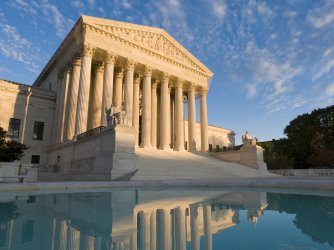Table of Contents
Why Yale Frat Chants Are Not 'Harassing' or 'Threatening'
It's unsurprising that the "Yale fraternity case," which we covered yesterday, is big news. A famous fraternity, of which both Presidents Bush were members, was suspended by Yale University for five years because its pledges marched through campus chanting "No means yes, yes means anal" and "My name is Jack, I'm a necrophiliac, I f--- dead women."
The profuse apologies of the president of the Yale chapter of Delta Kappa Epsilon (DKE), who called the pledge chants "inappropriate, disrespectful, and very hurtful to others," were apparently insufficient. The Women's Center at Yale described the speech as "an active call for sexual violence," and several members of the Yale community later filed a complaint with the U.S. Department of Education's Office for Civil Rights (OCR) for the creation of a hostile sexual environment as proscribed by Title IX. Title IX provides that, "[n]o person in the United States shall, on the basis of sex, be excluded from participation in, be denied the benefits of, or be subjected to discrimination under any education program or activity receiving Federal financial assistance ...."
The federal government, through OCR, is now investigating Yale over its response to the chants and other circumstances (the OCR complaint has not been revealed). And, after some kind of hearing and a certain amount of negotiating, Yale found DKE collectively responsible for behavior that "threatened and intimidated others, in violation of the Undergraduate Regulations of Yale College as they pertain to ‘harassment, coercion or intimidation' and ‘imperiling the integrity and values of the University community,'" and found several individual DKE members responsible for the same violations.
Of course this is big news. Women's rights advocates and fraternity brothers are not always the best of friends, and here the pledges satirized the victims' advocacy phrase "no means no" and used lewd language. Yet a more complex question must be addressed: should we really consider the pledges' speech to be threatening and intimidating, and should OCR consider that speech as actually excluding the women of Yale from equal participation in their education?
Yale is a private university, but its Undergraduate Regulations state that "every member of the university has an obligation to permit free expression in the university." Speech that is truly threatening (as defined in the law) or that would cause Yale to violate Title IX if unpunished, is not protected speech, but we should question whether the pledges' speech rises to that level.
Pledging a fraternity may involve engaging in taboo behavior, but courts understand that this taboo behavior, while offensive to many people's sensibilities, is still considered protected speech. For example, the Fourth Circuit Court of Appeals held that a fraternity's "ugly woman contest," held in the student union, was speech protected by the First Amendment. According to the Fourth Circuit,
The University certainly has a substantial interest in maintaining an educational environment free of discrimination and racism, and in providing gender-neutral education. Yet it seems equally apparent that it has available numerous alternatives to imposing punishment on students based on the viewpoints they express.
Iota Xi Chapter of Sigma Chi Fraternity v. George Mason Univ., 993 F.2d 386, 393 (4th Cir. 1993). Public universities that have attempted to rid their campuses of all traces of sexist speech are consistently chastised by the courts for failing to honor the protections of the First Amendment.
If Yale truly valued free expression, as stated in its Undergraduate Regulations or its famous 1974 Woodward Report, it could have employed various other means besides punishing the fraternity. In fact, Yale could condemn the pledges' remarks and disavow sexist speech--as Yale did, when first addressing the controversy--but it should be loath to punish and censor speech unless it is actually threatening or creates a hostile educational environment.
I find it hard to believe that any women at Yale were actually threatened by this speech, or seriously deemed it "an active call for sexual violence." In my opinion, the DKE brothers were more than likely chanting "yes means anal" precisely because that sentiment is so taboo, not because they were inciting others to commit sexual violence. (I would guess that those who actually believe that men should commit rapes would not express that view so publicly.) It is doubtful that the women of Yale are deprived of equal access to educational opportunities because of this one incident involving pure speech without conduct, especially when women can strike back with their own, far more enlightened speech. If anything, women at Yale who disliked the chants now know which male students they might avoid in social situations, and which fraternity they might report to their peers as contemptible.
Instead, the sentiment that I have heard from various friends with whom I have discussed the case is: "Yale should not condone speech of this nature from members of one of its fraternities." The fallacy here-and it is a fallacy that infects many clashes between free speech and other values-is that unless Yale actively punishes the speech, Yale is somehow endorsing the speech. In an environment where speech can thrive, students at Yale should be empowered to communicate Marxist and capitalist ideas alike, hedonistic and ascetic philosophies, and Democratic and Republican stances, without any of these views being attributed to Yale as an institution. DKE's speech is no more a product of Yale's values than the prayers expressed at Hillel or the activities of the Yale Pistol & Rifle Club.
If "My name is Jack, I'm a necrophiliac" represents Yale's understanding of speech that intimidates, then Yale has greatly undervalued the benefits of an environment where free expression is truly permitted.
Recent Articles
FIRE’s award-winning Newsdesk covers the free speech news you need to stay informed.

Don’t turn commencement season into cancellation season

MIT stops using DEI statements in faculty hiring

The 8 First Amendment cases the Supreme Court will decide this term
